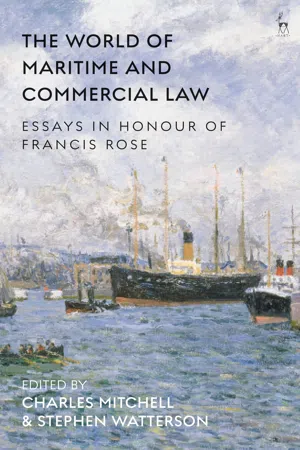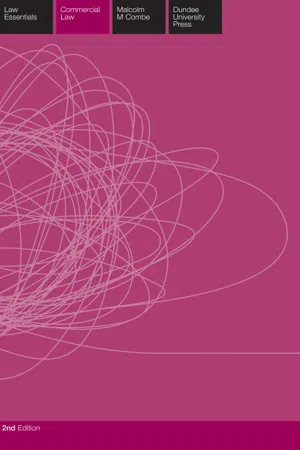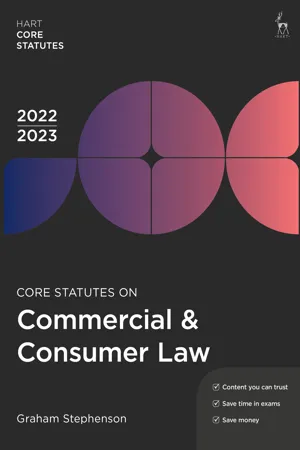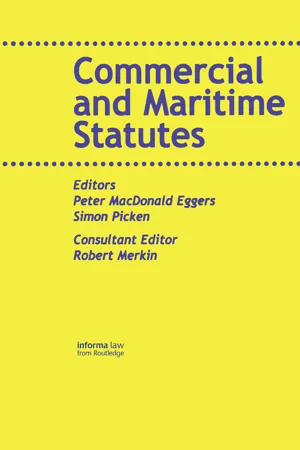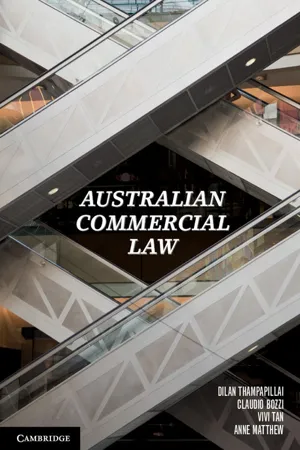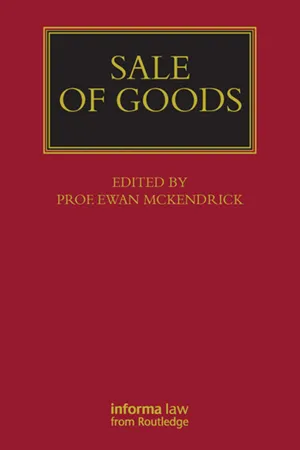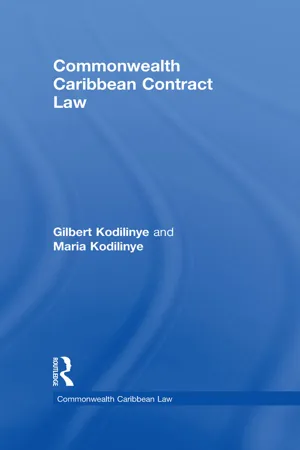Technology & Engineering
Sale of Goods Act 1979
The Sale of Goods Act 1979 is a UK legislation that governs the sale and purchase of goods. It outlines the rights and responsibilities of both buyers and sellers, including provisions for the quality and fitness for purpose of goods, as well as remedies for breaches of contract. The Act provides legal protection for consumers and businesses involved in the sale of goods.
Written by Perlego with AI-assistance
Related key terms
1 of 5
8 Key excerpts on "Sale of Goods Act 1979"
- eBook - ePub
The World of Maritime and Commercial Law
Essays in Honour of Francis Rose
- Charles Mitchell, Stephen Watterson, Charles Mitchell, Stephen Watterson(Authors)
- 2020(Publication Date)
- Hart Publishing(Publisher)
10 The Vanishing Scope of the Sale of Goods Act 1979 in the Twenty-first Century LOUISE GULLIFERI. IntroductionThis chapter considers the relevance of the Sale of Goods Act 1979 (SGA 1979) to modern commerce. As a result of changing financing practices, of developing technology and of legal developments, the scope of application of this once all-embracing Act has been severely reduced, so that, in many situations, it operates more as a source of inspiration and analogy than as hard law. Moreover, many aspects of consumer sales have been taken out of the SGA 1979 altogether and included in the more comprehensive Consumer Rights Act 2015. This chapter explores the ramifications of this conclusion and considers whether the resulting fragmentation can be characterised as beneficial common law flexibility or criticised as a failing to treat functionally similar cases alike.The chapter starts with some historical context, pointing out that even in Roman times, the line between sales and other methods of acquisition of goods was porous. Three requirements of the definition of a contract for sale of goods under section 2 of the SGA 1979 are then considered to illustrate how one or more are not met in many modern contracts of acquisition. First, the requirement that property in goods is transferred is considered in the contexts of equipment, inventory and hybrid contracts. Secondly, the requirement that what is sold is ‘goods’ is examined in the light of the huge rise in contracts for the supply of digital content. Thirdly, the requirement that the consideration is a price of money is considered in the light of acquisition in return for cryptocurrencies, of barter and of free acquisition. Given the number of acquisition contracts which fall outside the scope of the SGA 1979, the next section examines what is left to fall within it. The final section considers whether any of this matters, and concludes that there are convincing arguments that it does, with the result that there should be new legislation, to ensure that like cases are treated alike and to attempt to future-proof the law, at least for the next 40 years,1 if not for the next 126.2 - eBook - PDF
- Malcolm Combe(Author)
- 2013(Publication Date)
- EUP(Publisher)
SALE OF GOODS 1 1 SALE OF GOODS Prior to the enactment of the Sale of Goods Act 1893, the rules on the transfer of title of goods and implied warranties regarding the quality and fitness of goods were regulated by Scots common law. The common-law rules were particularly sophisticated and had been developed from civilian principles by the Scots judiciary since the Middle Ages. However, the majority of those rules were abandoned when the Sale of Goods Act 1893 was introduced in the late 19th century. The current law is contained within the Sale of Goods Act 1979 (“the Act”). THE CONTRACT OF SALE Introduction Pursuant to s 1(1) of the Act, the coverage of the Act is confined to the contract for the sale of goods which is defined in s 2(1) of the Act as follows: “A contract of sale of goods is a contract by which the seller transfers or agrees to transfer the property in the goods to the buyer for a money consideration called the price.” Thus, there are five essential features of the contract of sale of goods, namely: (1) a contract of sale; (2) two parties – a buyer and a seller; (3) the conveyance of property (which may coincide with the contract of sale); (4) goods; and (5) the price. A contract of sale It is fundamental that a contract must exist between a buyer and a seller. Hence, the usual rules of contract law will apply here, such as the requirements of offer and acceptance and an intention to create legal relations. In terms of s 2(3) of the Act, the contract may be conditional. Thus, the rights and obligations contained in it will require to be performed, and the contract purified, only on the satisfaction of a suspensive condition stipulated in the contract. Where a contract is subject to a suspensive condition or the contract stipulates that the seller will transfer title to the goods at some point in the future, s 2(5) of the Act classifies such a contract as an “agreement to sell”. Such an “agreement to sell” is nonetheless covered by the Act. - Graham Stephenson(Author)
- 2022(Publication Date)
- Hart Publishing(Publisher)
Sale of Goods Act 1979 115 Sale of Goods Act 1979 (1979, c. 54) PART I CONTRACTS TO WHICH ACT APPLIES 1. Contracts to which Act applies (1) This Act applies to contracts of sale of goods made on or after (but not to those made before) 1 January 1894 .(2) In relation to contracts made on certain dates, this Act applies subject to the modification of certain of its sections as mentioned in Schedule 1 below .(3) Any such modification is indicated in the section concerned by a reference to Schedule 1 below .(4) Accordingly, where a section does not contain such a reference, this Act applies in relation to the contract concerned without such modification of the section .(5) Certain sections or subsections of this Act do not apply to a contract to which Chapter 2 of Part 1 of the Consumer Rights Act 2015 applies .(6) Where that is the case it is indicated in the section concerned .PART II FORMATION OF THE CONTRACT Contract of Sale 2. Contract of sale (1) A contract of sale of goods is a contract by which the seller transfers or agrees to transfer the property in goods to the buyer for a money consideration, called the price .(2) There may be a contract of sale between one part owner and another .(3) A contract of sale may be absolute or conditional .(4) Where under a contract of sale the property in the goods is transferred from the seller to the buyer the contract is called a sale .(5) Where under a contract of sale the transfer of the property in the goods is to take place at a future time or subject to some condition later to be fulfilled the contract is called an agreement to sell .(6) An agreement to sell becomes a sale when the time elapses or the conditions are fulfilled subject to which the property in the goods is to be transferred .3.- eBook - ePub
- Peter MacDonald Eggers, Simon Picken(Authors)
- 2013(Publication Date)
- Informa Law from Routledge(Publisher)
Sale of Goods Act 1979
An Act to consolidate the law relating to the sale of goodsCommencement date:1 January 1980 Reports:Law Commission, No 137, 1987, Sale and Supply of Goods; Law Commission, No 215, 1993, Sale of Goods Forming Part of BulkPART ICONTRACTS TO WHICH ACT APPLIES1. Contracts to which Act applies (1) This Act applies to contracts of sale of goods made on or after (but not to those made before) 1 January 1894. (2) In relation to contracts made on certain dates, this Act applies subject to the modification of certain of its sections as mentioned in Schedule 1 below. (3) Any such modification is indicated in the section concerned by a reference to Schedule 1 below. (4) Accordingly, where a section does not contain such a reference, this Act applies in relation to the contract concerned without such modification of the section.PART IIFORMATION OF THE CONTRACTContract of sale 2. Contract of sale (1) A contract of sale of goods is a contract by which the seller transfers or agrees to transfer the property in goods to the buyer for a money consideration, called the price. (2) There may be a contract of sale between one part owner and another. (3) A contract of sale may be absolute or conditional. (4) Where under a contract of sale the property in the goods is transferred from the seller to the buyer the contract is called a sale. - eBook - PDF
- Dilan Thampapillai, Claudio Bozzi, Vivi Tan, Anne Matthew(Authors)
- 2015(Publication Date)
- Cambridge University Press(Publisher)
2 SALE OF GOODS Dilan Thampapillai 2.0 Introduction This chapter deals with the topic of the sale of goods. There are Sale of Goods Acts in each state and territory in Australia. All the various state Sale of Goods Acts in Australia are broadly the same in their terms and structure. 1 They are all based on the United Kingdom Sale of Goods Act 1893. As such UK court decisions are very relevant to the interpretation of our own legislation. The sale of goods is regulated in Victoria by the Goods Act 1958 (Vic) (‘Goods Act’) and this chapter will use this Act as a model with which to explore the various issues pertaining to the sale of goods. The Goods Act mostly codifies the common law relating to the sale of goods. The Goods Act is not a perfect code because the common law still appears to have some operation under certain provisions. The sale of goods is also regulated, in relation to transactions by a corporation to a consumer, by the Competition and Consumer Act 2010 (Cth) (‘CCA’). The Goods Act covers certain disputes that occur within Victoria where the law of Victoria is the law of the dispute. The CCA applies anywhere within Australia, but is limited in operation to corporations and, under certain circumstances, individuals. The CCA covers implied terms in consumer contracts, unconscionable conduct, unfair terms and other like matters in consumer contracts. The Goods Act applies to all contracts for the sale of goods where the basic definitional issues are concerned. Further, the Goods Act covers implied terms in sale of goods contracts that are not covered by the Australian Consumer Law. This chapter will look at the fundamental requirements of a sale of goods contract. It will explore the ways of distinguishing a sale of goods contract from other contracts. This chapter will also explore those terms that are implied into sale of goods contracts by the Goods Act. - eBook - ePub
- Ewan McKendrick(Author)
- 2020(Publication Date)
- Informa Law from Routledge(Publisher)
APPENDIX 1(1979 c.54)Sale of Goods Act 1979
16–001An Act to consolidate the law relating to the sale of goods.[6th December 1979]PART I: CONTRACT TO WHICH ACT APPLIES
Contracts to which Act applies
1.—(1) This Act applies to contracts of sale of goods made on or after (but not to those made before) 1 January 1894.(2) In relation to contracts made on certain dates, this Act applies subject to the modification of certain of its sections as mentioned in Schedule 1 below. (3) Any such modification is indicated in the section concerned by a reference to Schedule 1 below. (4) Accordingly, where a section does not contain such a reference, this Act applies in relation to the contract concerned without such modification of the section.PART II: FORMATION OF THE CONTRACT
Contract of saleContract of sale
2.—(1) A contract of sale of goods is a contract by which the seller transfers or agrees to transfer the property in goods to the buyer for a money consideration, called the price.(2) There may be a contract of sale between one part owner and another. (3) A contract of sale may be absolute or conditional. (4) Where under a contract of sale the property in the goods is transferred from the seller to the buyer the contract is called a sale. - eBook - ePub
- Chris Monaghan(Author)
- 2015(Publication Date)
- Taylor & Francis(Publisher)
London Borough of Southwark v IBM UK Ltd [2011] EWHC 549 (TCC) it was held that as the software had been supplied under a licence there had not been a transfer of property as required by s.2(1) SGA 1979. This meant that the court did not have to consider whether the software was a good.Future goods
It is important to note that had KAE entered into the contract of sale with GML and it had not yet manufactured the grinding machines, then the goods would be classified as future goods. It would still be a valid contract, known as an agreement to sell, notwithstanding the fact that the goods do not exist at the time when the contract was entered into (s.5 SGA 1979).Sale of Goods Act 1979The SGA 1979 applies to both business-to-business contracts, business-to-consumer contracts, and finally to consumer-to-consumer contracts. In this chapter we will focus on business-to-business contracts. However, it should be noted that different rules can apply to each of the above contracts and so you must be careful to distinguish which type of contract you are dealing with.The SGA 1979 contains rules that govern a number of important aspects of the contract. These include:• stipulations relating to the time of payment, the requirement that the seller has a right to transfer the legal title, the quality and description of the goods;• where the goods have perished before, or after, the contract has been entered into;• the transfer of the property in the goods;• the passing of the risk in the goods;• the ability of the seller to transfer the physical goods to the buyer, while retaining the title (property) in the goods;• the rule that the seller cannot transfer good title if he does not have this himself;• the remedies available to both the buyer and the seller in the event that the contract has been breached;• the rules relating to the delivery, acceptance and inspection of the goods.We shall consider each of these in turn and as we do this we will look at some of the common clauses that you will find in a commercial contract. These are known as boilerplate clauses as they are common clauses that you would expect to see in a contract of this type. This will enable you to see how these clauses relate to the legal rules. - eBook - ePub
- Gilbert Kodilinye, Maria Kodilinye(Authors)
- 2013(Publication Date)
- Routledge(Publisher)
- Nothing in this Act shall affect the written laws relating to bills of sale or any other written law relating to the sale of goods.
- The provisions of this Act relating to contracts of sale do not apply to any transaction in the form of a contract of sale which is intended to operate by way of mortgage, pledge, charge or other security.4
4 See s 59, Sale of Goods Act, Ch 82:30 (Trinidad and Tobago); s 62, Sale of Goods Act 1978 (Bermuda); and s 59, Sale of Goods Act (Jamaica).Similar savings clauses are contained in the legislation of other Commonwealth Caribbean countries.55 For example, see s 59, Sale of Goods Act, Cap 318 (Barbados); s 59, Sale of Goods Act, Cap 393 (Antigua and Barbuda); s 70, Sale of Goods Act 1978 (Bermuda); s 61, Sale of Goods Act, Cap 261 (Belize); s 59, Sale of Goods Act, Ch 337 (The Bahamas); and s 59, Sale of Goods Act (Jamaica).The sale of goods legislation enacted in the various jurisdictions of the Commonwealth Caribbean is based closely on the UK Sale of Goods Acts of 1893 and 1979. To the extent that the Caribbean legislation is ambiguous or silent, judicial decisions relating to the UK legislation are useful supplements to local case law in interpreting the Caribbean statutes. This process of interpretation must, however, be informed by an examination of the intention of the parties, so that the legislation is not interpreted so strictly as to produce a result that the parties could not reasonably have intended.Types of goods covered
Sale of goods legislation applies to contracts for the sale of goods, whether absolute or conditional.6 Contracts for the sale of goods are defined as contracts whereby the seller transfers or agrees to transfer the property in goods for consideration (that is, for a price). This definition includes contracts of sale between one part owner and another.7 Goods are defined as all chattels personal other than choses in actionand money, and can include ships,8 building materials,9 cars,10 cattle11 and alcoholic beverages.12
Index pages curate the most relevant extracts from our library of academic textbooks. They’ve been created using an in-house natural language model (NLM), each adding context and meaning to key research topics.
